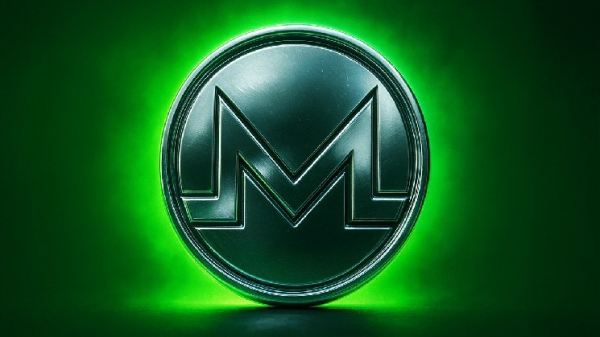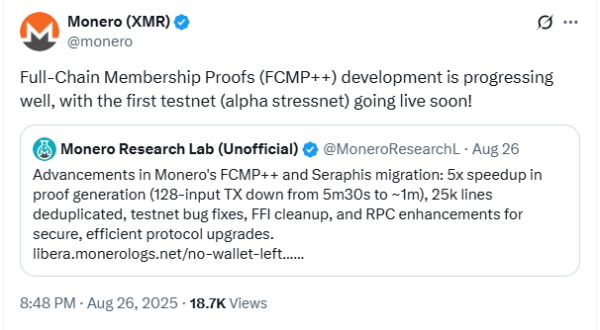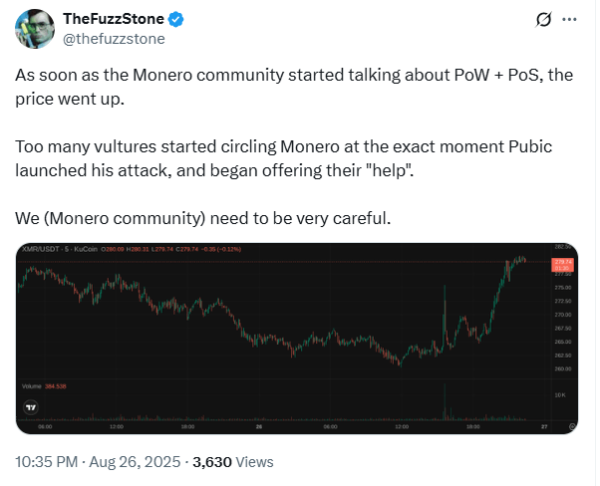Monero Accelerates FCMP Upgrade After Qubic’s 51% Attack Attempt

After concerns arose regarding a potential 51% attack by the Qubic mining pool, Monero announced on August 26 that the development of its Full-Chain Membership Proofs (FCMP) upgrade is advancing quickly, with a testnet launch expected soon.
Codebase Improvements and Countermeasures
Following the recent controversy over a purported 51% attack by the Qubic mining pool, Monero confirmed on Aug. 26 that its Full-Chain Membership Proofs (FCMP) development is advancing rapidly, with the first testnet slated to go live soon. This upgrade is hailed as a significant technical leap forward, designed to address a long-standing vulnerability in Monero’s privacy model.

As a core benefit, the upgrade will enable Monero to generate zero-knowledge proofs that allow users to verify a transaction’s validity without revealing identities or transaction amounts. The new technology will also dramatically reduce the time it takes for XMR transactions with multiple inputs to generate cryptographic proofs, cutting the process from over 5 minutes to just one minute.
In addition, Monero developers have been cleaning up the codebase, removing redundant and duplicate code to make it leaner, easier to maintain, and less susceptible to bugs. According to a recent X post by Monero Research Lab, developers have also fixed bugs and cleaned up the foreign function interface (FFI) to improve cross-language compatibility and reduce technical debt.
Monero’s confirmation that FCMP is progressing well appears to be a direct effort to reassure supporters and address the vulnerabilities that motivated the Qubic mining pool to pursue a 51% attack. Monero is reportedly leveraging elements of Dash’s technology stack as part of a strategic move to counter Qubic.
While there is no consensus on whether Qubic actually achieved the feat, market data suggest that the broader crypto community was never fully convinced that the mining pool had indeed accounted for more than half of Monero’s hashrate. While the claim led to a brief sell-off that saw XMR briefly plunge to just above $233 on Aug. 16, the privacy coin quickly recovered and has been trading above $250 ever since.
The Hybrid Solution Discussion
The Qubic 51% attack claim not only reignited a debate within the crypto community but has underscored the importance of transparency and verification within the blockchain ecosystem. Joel Valenzuela, a Dash DAO core member, described the Qubic attempt as a “fascinating experiment” that should be a cause for concern for ASIC-resistant chains.
“Qubic only showed what is possible. Much better-funded and more determined actors could cause so much more chaos. This could be the beginning of an extinction-level threat for proof-of-work. It’s an ‘evolve or die’ moment,” Valenzuela stated.
The Dash DAO core member, however, also believes the controversy could spur an unprecedented level of innovation on proof-of-work (PoW) networks. Still, the claim has once again brought to the forefront the idea of a hybrid consensus solution for Monero, an idea reportedly endorsed by key developer Luke Parker.

Valenzuela also noted that Zano, which uses a privacy protocol similar to that of Monero, already has such a hybrid solution. However, while some in the Monero community are now warming to the idea, Valenzuela reckons the community “is probably split 50/50 on this issue.”
 Bitcoin
Bitcoin  Ethereum
Ethereum  Tether
Tether  XRP
XRP  USDC
USDC  Solana
Solana  TRON
TRON  Lido Staked Ether
Lido Staked Ether  Dogecoin
Dogecoin  Figure Heloc
Figure Heloc  WhiteBIT Coin
WhiteBIT Coin  Cardano
Cardano  Bitcoin Cash
Bitcoin Cash  USDS
USDS  Wrapped stETH
Wrapped stETH  LEO Token
LEO Token  Hyperliquid
Hyperliquid  Wrapped Bitcoin
Wrapped Bitcoin  Chainlink
Chainlink  Binance Bridged USDT (BNB Smart Chain)
Binance Bridged USDT (BNB Smart Chain)  Monero
Monero  Canton
Canton  Ethena USDe
Ethena USDe  Stellar
Stellar  Wrapped eETH
Wrapped eETH  Rain
Rain  USD1
USD1  sUSDS
sUSDS  Litecoin
Litecoin  Hedera
Hedera  Zcash
Zcash  Coinbase Wrapped BTC
Coinbase Wrapped BTC  Dai
Dai  Avalanche
Avalanche  PayPal USD
PayPal USD  WETH
WETH  Sui
Sui  Shiba Inu
Shiba Inu  Toncoin
Toncoin  USDT0
USDT0  Cronos
Cronos  World Liberty Financial
World Liberty Financial  Tether Gold
Tether Gold  Polkadot
Polkadot  Uniswap
Uniswap  PAX Gold
PAX Gold  MemeCore
MemeCore  Ethena Staked USDe
Ethena Staked USDe  Mantle
Mantle  BlackRock USD Institutional Digital Liquidity Fund
BlackRock USD Institutional Digital Liquidity Fund  Aave
Aave  Pepe
Pepe  Bittensor
Bittensor  Aster
Aster  Falcon USD
Falcon USD  OKB
OKB  Sky
Sky  Global Dollar
Global Dollar  Circle USYC
Circle USYC  syrupUSDC
syrupUSDC  Pi Network
Pi Network  Bitget Token
Bitget Token  Ripple USD
Ripple USD  HTX DAO
HTX DAO  NEAR Protocol
NEAR Protocol  Ethereum Classic
Ethereum Classic  Ondo
Ondo  Internet Computer
Internet Computer  BFUSD
BFUSD  POL (ex-MATIC)
POL (ex-MATIC)  Worldcoin
Worldcoin  KuCoin
KuCoin  Superstate Short Duration U.S. Government Securities Fund (USTB)
Superstate Short Duration U.S. Government Securities Fund (USTB)  Gate
Gate  Pump.fun
Pump.fun  Jupiter Perpetuals Liquidity Provider Token
Jupiter Perpetuals Liquidity Provider Token  Cosmos Hub
Cosmos Hub  Midnight
Midnight  Quant
Quant  Ethena
Ethena  Jito Staked SOL
Jito Staked SOL  NEXO
NEXO  Official Trump
Official Trump  Binance-Peg WETH
Binance-Peg WETH  USDtb
USDtb  Rocket Pool ETH
Rocket Pool ETH  Filecoin
Filecoin  Algorand
Algorand  Binance Bridged USDC (BNB Smart Chain)
Binance Bridged USDC (BNB Smart Chain)  Aptos
Aptos  Render
Render  Wrapped BNB
Wrapped BNB  Spiko EU T-Bills Money Market Fund
Spiko EU T-Bills Money Market Fund  Function FBTC
Function FBTC  USDD
USDD  OUSG
OUSG  pippin
pippin  Janus Henderson Anemoy AAA CLO Fund
Janus Henderson Anemoy AAA CLO Fund  Ondo US Dollar Yield
Ondo US Dollar Yield  syrupUSDT
syrupUSDT  VeChain
VeChain  Binance Staked SOL
Binance Staked SOL  Beldex
Beldex  Arbitrum
Arbitrum  Bonk
Bonk  Janus Henderson Anemoy Treasury Fund
Janus Henderson Anemoy Treasury Fund  Usual USD
Usual USD  Stable
Stable  Polygon Bridged USDC (Polygon PoS)
Polygon Bridged USDC (Polygon PoS)  GHO
GHO  Solv Protocol BTC
Solv Protocol BTC  Jupiter
Jupiter  Lombard Staked BTC
Lombard Staked BTC  A7A5
A7A5  Stacks
Stacks  Decred
Decred  clBTC
clBTC  TrueUSD
TrueUSD  Sei
Sei  Pudgy Penguins
Pudgy Penguins  Virtuals Protocol
Virtuals Protocol  StakeWise Staked ETH
StakeWise Staked ETH  EURC
EURC  USDai
USDai  Kinetiq Staked HYPE
Kinetiq Staked HYPE  Dash
Dash  tBTC
tBTC  PancakeSwap
PancakeSwap  WrappedM by M0
WrappedM by M0  Tezos
Tezos  Kinesis Gold
Kinesis Gold  Ether.fi
Ether.fi  JUST
JUST  Artificial Superintelligence Alliance
Artificial Superintelligence Alliance  Curve DAO
Curve DAO  Mantle Staked Ether
Mantle Staked Ether  Story
Story  Lighter
Lighter  Polygon PoS Bridged DAI (Polygon POS)
Polygon PoS Bridged DAI (Polygon POS)  c8ntinuum
c8ntinuum  Resolv wstUSR
Resolv wstUSR  Chiliz
Chiliz  COCA
COCA  Gnosis
Gnosis  Aerodrome Finance
Aerodrome Finance  Liquid Staked ETH
Liquid Staked ETH  PRIME
PRIME  Arbitrum Bridged WBTC (Arbitrum One)
Arbitrum Bridged WBTC (Arbitrum One)  Injective
Injective  Bitcoin SV
Bitcoin SV  BitTorrent
BitTorrent  AINFT
AINFT  Wrapped Flare
Wrapped Flare  Kaia
Kaia  Celestia
Celestia  L2 Standard Bridged WETH (Base)
L2 Standard Bridged WETH (Base)  LayerZero
LayerZero  Steakhouse USDC Morpho Vault
Steakhouse USDC Morpho Vault  Pyth Network
Pyth Network  Sun Token
Sun Token  ADI
ADI  IOTA
IOTA  SPX6900
SPX6900  Binance-Peg XRP
Binance-Peg XRP  The Graph
The Graph  Ether.Fi Liquid ETH
Ether.Fi Liquid ETH  FLOKI
FLOKI  Renzo Restaked ETH
Renzo Restaked ETH  JasmyCoin
JasmyCoin  crvUSD
crvUSD  sBTC
sBTC  Lido DAO
Lido DAO  Olympus
Olympus  Legacy Frax Dollar
Legacy Frax Dollar  Jupiter Staked SOL
Jupiter Staked SOL  Conflux
Conflux  Savings USDD
Savings USDD  Optimism
Optimism  DoubleZero
DoubleZero  Helium
Helium  Marinade Staked SOL
Marinade Staked SOL  Telcoin
Telcoin  Arbitrum Bridged WETH (Arbitrum One)
Arbitrum Bridged WETH (Arbitrum One)  Maple Finance
Maple Finance  BTSE Token
BTSE Token  Ethereum Name Service
Ethereum Name Service  Starknet
Starknet  Staked Aave
Staked Aave 